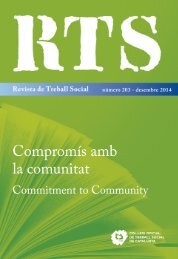Employmentweb_low
Employmentweb_low
Employmentweb_low
Create successful ePaper yourself
Turn your PDF publications into a flip-book with our unique Google optimized e-Paper software.
employment relations and health inequalities: a conceptual and empirical overvieW<br />
classification (i.e., "manual worker") as an indicator of economic inequality has a long tradition in mental health research. because<br />
job type is an indicator of control over the labour process, it is also a marker of workplace effects on mental health. in addition to<br />
being manual workers, Korean hitech workers were exposed to a particularly hazardous form of work organisation for years, being<br />
subjected to constant vigilance with cameras and often facing degrading and humiliating treatment (such as denial of the right to<br />
go to the bathroom). it is not surprising that workers exposed to this kind of workplace abuse could suffer from poor mental health.<br />
it is also known that the impact of Korean employment conditions on workers' mental health is worse for immigrants,<br />
minorities and, in particular, union members. this happens because of their labour market vulnerability and the hostility of<br />
management to union organisers and members: this is often the case in authoritarian regimes. there are also studies<br />
showing a high prevalence of depression in nursing professions due to overwork and supervisor abuse (muntaner et al.,<br />
2006a). abusive workplaces have been associated with anxiety and depression, counting among them many blue collar<br />
(manual) workplaces (muntaner & eaton, 2004). in the hitech case, abuse took many forms. For example, on one occasion<br />
workers were kept from opening the door for ventilation.<br />
hazardous workplaces can increase the risk of depression. it has been shown that work characterised by absence of worker<br />
control or planning is associated with major depression (mausner-dorsch & eaton, 2000). also, the negative effects of conflict with<br />
management have been associated with depression. recent evidence points to management abuse, labour law violations, and<br />
threats of being fired as potential risk factors for depression (muntaner et al., 2004; muntaner et al., 2006b). in several studies<br />
carried out in the united states, physical demands also predicted psychotic episodes (muntaner, tien, eaton, & garrison, 1991).<br />
physical demands have been associated with psychiatric illness in other populations as well (muntaner et al., 2004). the Korean<br />
hitech workers were actually exposed to all of these risk factors simultaneously over the last five years.<br />
the bright side of the studies mentioned above is that they suggest the possibility of prevention, since they impinge on factors<br />
that might be modified by union pressure or legal victories ensuring a healthy workplace without abuse. some researchers feel that<br />
the reorganisation of work can improve the productivity and health of the workers, while others affirm that the relentless search for<br />
profits is by definition in conflict with workers' mental health (muntaner & eaton, 2004). We do see that several countries, including<br />
sweden, spain, and the uK, have legislation on the unacceptable levels of work stress, and provisions are made to use these laws<br />
in arbitration. one example is the norwegian Worker protection and Working environment act of 1977, amended in 2004<br />
(particularly sections 1, 7, 12 and 14). this act al<strong>low</strong>s companies to be fined by the state for promoting environments conducive to<br />
<strong>low</strong> autonomy, management harassment, lack of freedom on the job, overwork, threats of firing, psychological harassment,<br />
mobbing, and illegal threats to union members. to protect workers around the globe from the mental health effects of managerial<br />
pressure such as those suffered by Korean hitech workers, fair employment measures should be promoted by the ilo. next,<br />
governments should enact them widely to support the worker's basic right to mental health.<br />
References<br />
lee, h. e. (2005, may 10). all trade union members were diagnosed as clinically depressed. Hankyerae.<br />
mausner-dorsch, h., & eaton, W. W. (2000). psychosocial work environment and depression: epidemiologic assessment of<br />
the demand-control model. American Journal of Public Health, 90(11), 1765-1770.<br />
muntaner, c., & eaton, W. W. (2004). psychosocial and organizational factors. health effects: mental illness. in J. stellman<br />
(ed.), ilo Encyclopedia of Occupational Health and Safety (pp. 34.62-34.64). geneva: international labour office.<br />
muntaner, c., li, y., Xue, X., o'campo, p., chung, h. J., & eaton, W. W. (2004). Work organization, area labor-market<br />
characteristics, and depression among us nursing home workers: a cross-classified multilevel analysis. International<br />
Journal of Occupational and Environmental Health, 10(4), 392-400.<br />
muntaner, c., li, y., Xue, X., thompson, t., chung, h., & o'campo, p. (2006a). county and organizational predictors of depression<br />
symptoms among <strong>low</strong>-income nursing assistants in the usa. Social Science and Medicine, 63(6), 1454-1465.<br />
muntaner, c., li, y., Xue, X., thompson, t., o'campo, p., chung, h., et al. (2006b). county level socioeconomic position, work<br />
organization and depression disorder: a repeated measure cross-classified multilevel analysis of <strong>low</strong>-income nursing<br />
home workers. Health and Place, 12(4), 688-700.<br />
muntaner, c., tien, a. y., eaton, W. W., & garrison, r. (1991). occupational characteristics and the occurrence of psychotic<br />
disorders. Social Psychiatry and Psychiatric Epidemiology, 26(6), 273-280.<br />
park, J. h. (2005, June 3). Workers' compensation for hitech rcd Korea workers declined. Hankyerae.<br />
Case study 40. Health consequences of over work: the case of Japan. - Joan benach, tsutomu hoshuyama, yutaka yasui and paul landsbergis<br />
although average working hours vary widely across countries, approximately 22 per cent of workers worldwide are<br />
working more than 48 hours per week. the worst situation takes place in developing/poor countries, where hundreds of<br />
million of workers must work over 50 hours per week. in peru and indonesia, for example, at least half of the workers work<br />
such excessive hours. the expansion of informal employment and service sectors are major sources of longer working<br />
hours, particularly in industries with shift work and "unsocial" hours such as wholesale and retail trade, hotels and<br />
201



